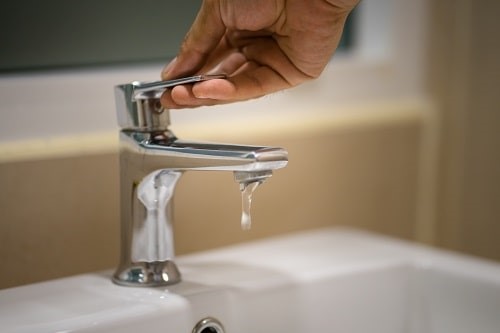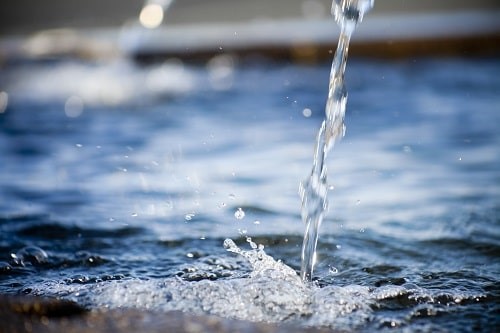Adopting simple water efficiency measures can save a business money and help cut global greenhouse gas emissions.
Features
Why businesses should save water
 While it is true that water is relatively cheap, saving water will save you money. Photograph: iStock
While it is true that water is relatively cheap, saving water will save you money. Photograph: iStock
Businesses have had a lot to contend with this last year and saving water is unlikely to have been near the top of the priority list. But as we come out of lockdown here are six great reasons why businesses should get on the case with saving water.
- Increasing resilience – all businesses rely on water to operate and for the health and safety of their employees. Imagine how your business would cope if it wasn’t there when you turned on the taps; the cost of a loss of supply to businesses in London is estimated at over £300 million per day. Yet modelling by the National Infrastructure Commission and the Environment Agency has shown that without us all taking measures to save water we face a shortfall of over 3.5 billion litres per day by 2050. Businesses consume around 30 per cent of our water supplies so have a big part to play.
- Achieving Net Zero – every litre of water your business uses has a carbon There are the emissions arising from treating and pumping water to you and from the removal of your drainage and wastewater. But these emissions are often dwarfed by the emissions arising in your premises from using water, especially hot water. Saving water will reduce your carbon emissions and is a quick and relatively easy way to help you reach Net Zero. At a UK scale we estimate that reducing household and business water consumption by just 20 per cent would cut UK emissions by one per cent.
- Protecting the local environment – the water your business uses comes from local rivers and underground aquifers. These local places are hugely important for our wellbeing, as highlighted during the pandemic. However, over 40 per cent of the biggest water using businesses are in river catchments with low water availability. The more water you can save the more water is left in the environment that your staff and your customers enjoy and value.
- Saving money – while it is true that water is relatively cheap, saving water will save you money. Not just on your water bill but also on your energy bill. There are lots of examples out there such as Glasgow City Council who are saving £54,000 a year after reviewing water use in two schools, or the University of Salford who are saving over £100,000 a year. As businesses reopen it is an ideal time to save by fixing leaks and saving water.
- Engaging employees – water saving is a great way to engage
your workforce on a key aspect of sustainability. Water use is very visible and is something where everyone can make a difference; from turning off taps to filling the dishwasher or reporting a leaking toilet. In a recent survey 67 per cent of employees thought that their organisations could do more to save water. - Corporate Social Responsibility (CSR) – saving water helps demonstrate your Corporate Social Responsibility. Using water efficiently is an important part of the United Nations Sustainable Development Goals (UN SDG) which many businesses use as a framework for their CSR activity. UN SDG 6.4 states “by 2030, substantially increase water-use efficiency across all sectors” with an indicator of “change in water use efficiency over time”.
- How can my business save water?
 Knowing how much water you use and how much it costs is a great starting point. Photograph: iStock
Knowing how much water you use and how much it costs is a great starting point. Photograph: iStock
Fortunately saving water is pretty straightforward. Essentially, for most businesses, it boils down to:
- Understanding how much you are using and where
- Fixing leaks and fitting more efficient devices
- Encouraging a water saving culture at work.
Knowing how much water you use and how much it costs is a great starting point. Without this information it is hard to measure savings. Smart water meters and data loggers are increasingly common and can provide you with high resolution consumption data and help identifying leaks which often show up as continuous night-time consumption.
You should also review your water using devices and process to see if there is potential for savings. Simple things like low flow taps and urinal controls that switch off at weekends can save a lot of water. And finally, you should engage with employees to promote a water saving culture at work, encouraging the team to save water and report leaks.
- What can I do next?
As a first step, find out who is responsible for water in your organisation. It might be the office manager; the facilities team or you may have an environmental or sustainability lead. Speak to them about what is currently happening and what more could be done
Engage with your water retailer or water company to see how they can help you. If you are in England, Wales or Scotland you may buy your water from a water retailer rather than direct from the water company.
At Waterwise, a not-for-profit water efficiency NGO, we have produced a simple Waterwise guide to the sort of questions you can ask them (bit.ly/33HUCbY).
Waterwise is also here to help and we can offer impartial advice and staff awareness raising and training sessions. We also recognise good practice through our Checkmark scheme.
For more information see: waterwise.org.uk
E: [email protected]
Dr Nathan Richardson is Head of Policy and Strategy at Waterwise
FEATURES

Turning sustainability compliance into business opportunity
By Alastair Loasby, Saffery LLP on 27 February 2026
Businesses that publicly demonstrate good sustainability performance can reap financial, reputational and other benefits, but it’s important to minimise the cost of any reporting on sustainability issues and to focus efforts on improving aspects of sustainability where the benefits outweigh the costs.

How to mitigate the hearing loss cost escalation tsunami
By Peter Wilson, Industrial Noise and Vibration Centre (INVC) on 06 February 2026
Employers need to adopt the latest and most effective noise risk evaluation and management measures, or face rapidly-rising compensation claims for noise-induced hearing loss at work.

Young drivers and work-related road risk: why employers must act now
By Simon Turner, Driving for Better Business on 06 February 2026
Young drivers have a higher risk of being involved in road collisions due to factors such as their inexperience, so when employing them to drive for work, it is vital they receive the right support to help them grow into safe professionals behind the wheel.



